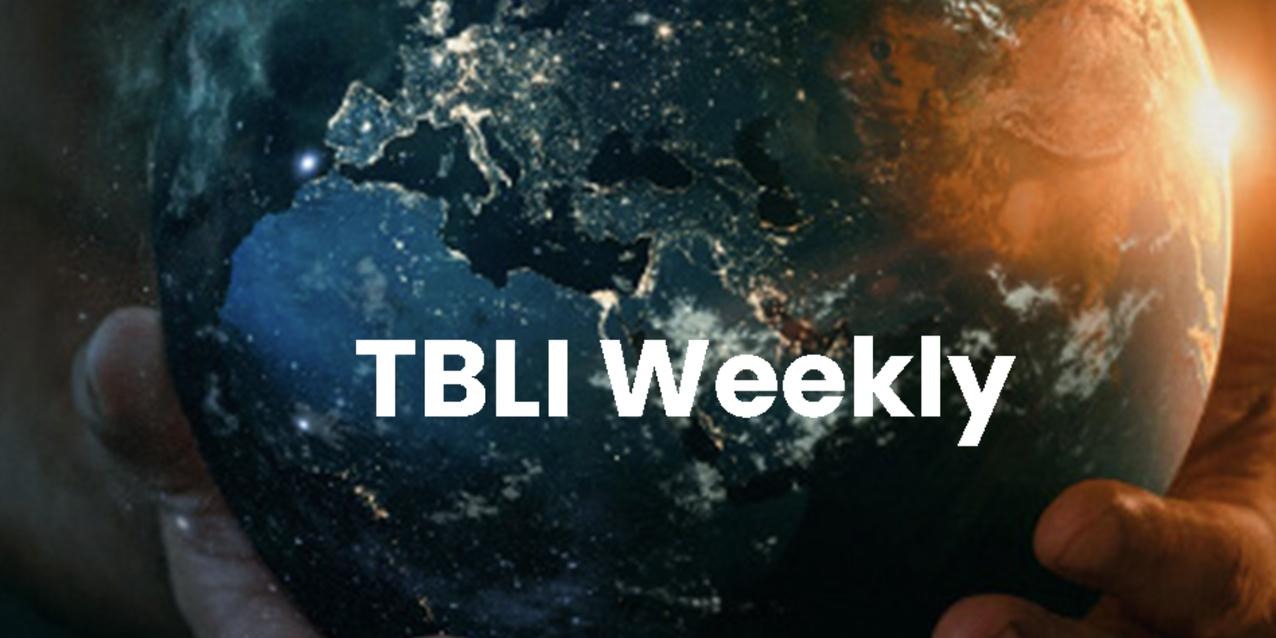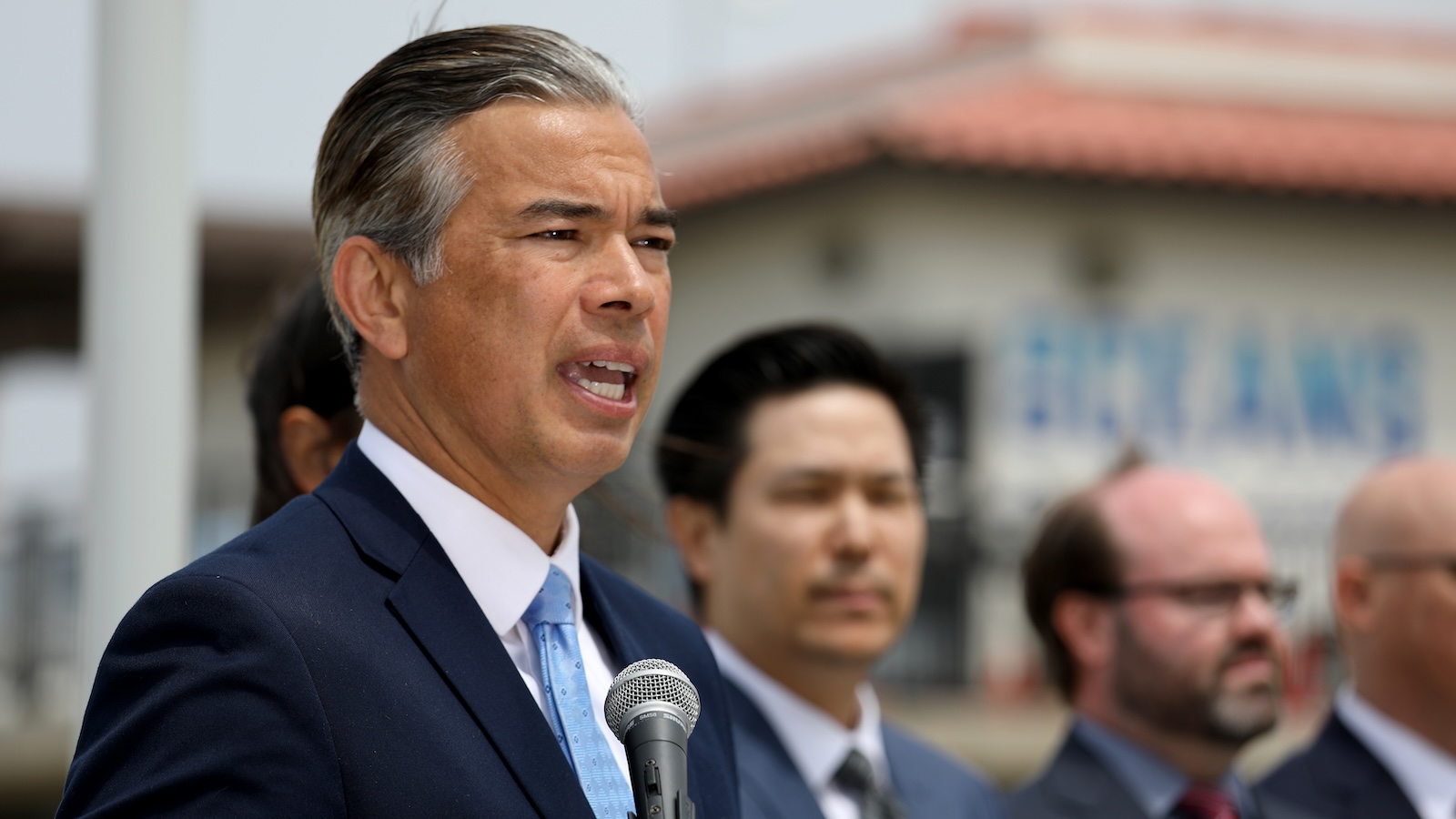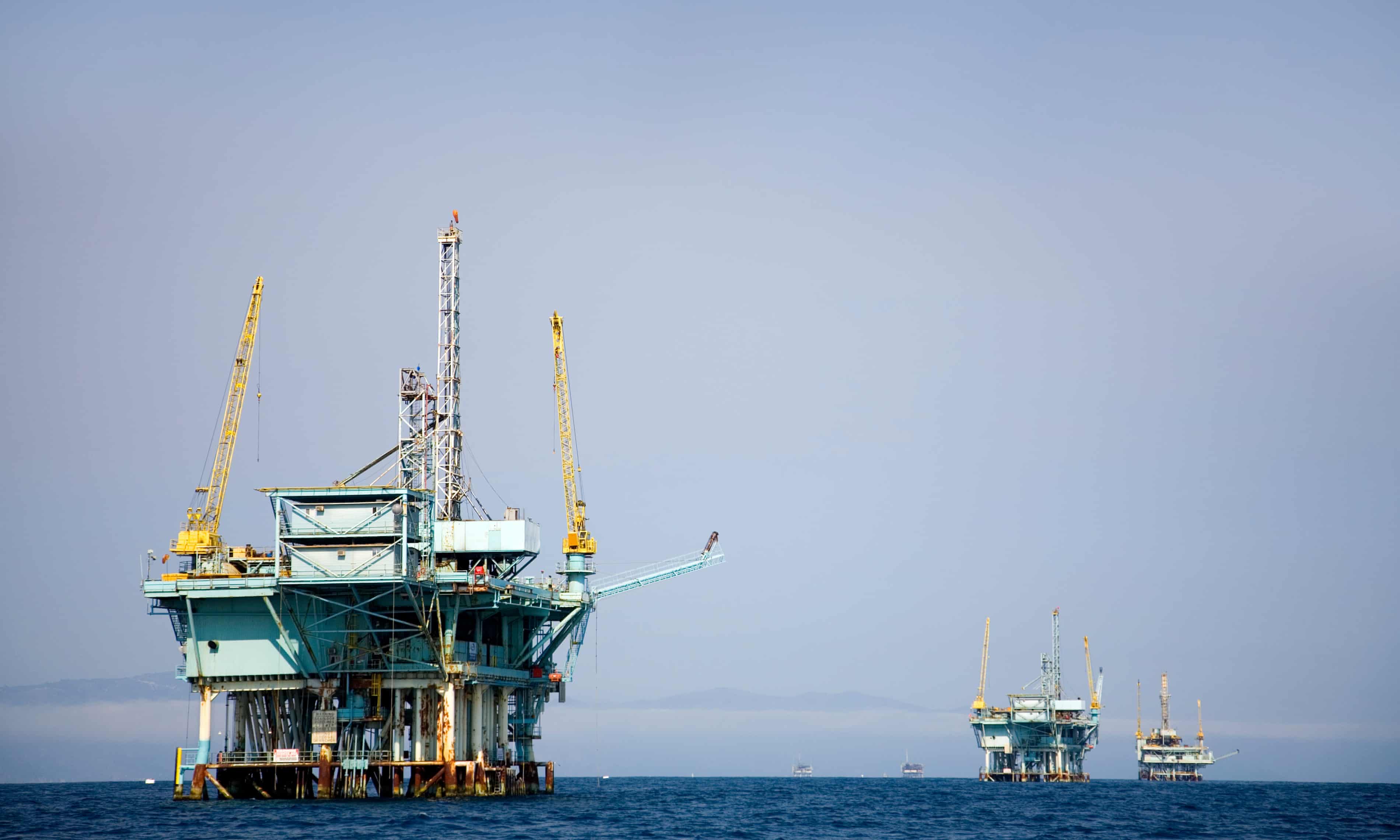
Your Weekly Guide to Sustainable Investment
This week's TBLI Events
Thursday, September 26th, 15:00 CEST
Procuring a Fix to the Climate Crisis.
Three things that people will learn:
- The What, Why, and How of Net-Zero Procurement (NZP)
- How NZP can be the missing market force engaging companies in the race to net-zero GHG emissions.
- How the deployment of NZP with speed and global scale can fix the climate crisis
Bob is a leading expert on sustainability justifications, reporting frameworks, and sustainable procurement. Bob applies his business and leadership experience from his 34-year career at IBM Canada to engage the business community in proactively avoiding risks and capturing opportunities by using smart environmental, social, and governance (ESG) practices.
TBLI Impact Networking (Mixer) Sept.

Friday, September 27 · 4 - 5:30pm CEST
Expand your professional network from the comfort of your phone or laptop.
Join the TBLI Virtual Impact Networking (Mixer) and connect with impact investors, entrepreneurs, and sustainability thought leaders worldwide through our immersive virtual platform.
Engage in timed 1-on-1 speed networking sessions, where you'll be matched with new individuals for each chat round.
Whether you're a seasoned expert or just starting your journey, the TBLI Impact Networking (Mixer) is the perfect platform to expand your network and gain valuable insights. Engage in lively discussions, share your experiences, and discover new opportunities to drive sustainable change.
Don't miss out on this exciting event! Register now and be a part of the TBLI Impact Networking (Mixer) community. Together, let's create a better future!
Sign up & expand your network!
 Would you like to watch a recording of a past TBLI Talk event? Visit this page
Would you like to watch a recording of a past TBLI Talk event? Visit this page
TBLI Capital Connect
We've expanded our Capital Connect service so start-ups and companies without significant budget for fundraising efforts can tap into our extensive network of investors, and get connected to curated investor matches that are actively investing in your sector.
Are you currently looking to meet impact investors? This service might be just for you!
More info
Arrange call to learn more
Earth may have breached seven of nine planetary boundaries, health check shows

Ocean acidification close to critical threshold, say scientists, posing threat to marine ecosystems and global liveability
Industrial civilisation is close to breaching a seventh planetary boundary, and may already have crossed it, according to scientists who have compiled the latest report on the state of the world’s life-support systems.
“Ocean acidification is approaching a critical threshold”, particularly in higher-latitude regions, says the latest report on planetary boundaries. “The growing acidification poses an increasing threat to marine ecosystems.”
The report, from the Potsdam Institute for Climate Impact Research (PIK), builds on years of research showing there are nine systems and processes – the planetary boundaries – that contribute to the stability of the planet’s life-support functions.
Thresholds beyond which they can no longer properly function have already been breached in six. Climate change, the introduction of novel entities, change in biosphere integrity and modification of biogeochemical flows are judged to be in high-risk zones, while planetary boundaries are also transgressed in land system change and freshwater change but to a lesser extent. All have worsened, according to the data.
Stratospheric ozone depletion has remained stable, however, and there has been a slight improvement in atmospheric aerosol loading, the research says.
At a briefing outlining the findings, Levke Caesar, a climate physicist at PIK and co-author of the report, said there were two reasons the levels of ocean acidification were concerning.
“One is [that] the indicator for ocean acidification, which is the current aragonite separation state, while still being in the safe operating space, is approaching the threshold of transgressing the safe boundary,” Caesar said.
“The second is that there are actually several new studies that were published over the last years that indicate that even these current conditions may already be problematic for a variety of marine organisms, suggesting a need [to] re-evaluate which levels can actually be called safe.”
Ocean acidification was getting worse globally, with the effects most pronounced in the Southern Ocean and the Arctic Ocean, she added.
Ocean acidification is the phenomenon of increasing acidity (decreasing pH) in ocean water due to the absorption of atmospheric CO2. The process not only harms calcifying organisms, potentially leading to food web breakdown, but also reduces the ocean’s efficiency in acting as a vital carbon sink.
“This illustrates the connection between ocean acidification … and biosphere integrity,” Caesar said. “Indeed, one of the main messages of our report is that all nine planetary boundaries are highly interconnected.
“This means that any human perturbation of the global environment that we observe at the moment … cannot be addressed as if they were separate issues, which is how it is at the moment primarily handled. Because this type of approach ignores that the components of the Earth system constantly interact forming a large network where changes in one area affect the others.”
Planetary boundary science was pioneered in 2009 by Johan Rockstrom, the director of the PIK, and others. In that research and two subsequent reports, the researchers identified and quantified boundaries relating to climate change, biosphere, land system change, freshwater change, biogeochemical flows, ocean acidification, atmospheric aerosol loading, ozone layer depletion and the introduction of novel entities, such as synthetic chemicals, to the environment.
The transgression of boundaries in each of those areas risks disrupting the stability, resilience and liveability of the state of the planet that has persisted for the past 12,000 years and that has allowed the rise of complex human civilisation.
The report, which came a year after the last, is the first of what will now be annual “planetary health checks” published by PIK, Rockstrom said.
“We recognise that the planet’s health … is at such risk today that we in science must also now step up and step right out in to the uncomfortable zone and say that we are now committing ourselves to produce every year a scientific measuring of the entire health assessment – a risk assessment – across all the planetary boundaries,” he said. “This is much more than science, this is science for change.”
Unlike previous iterations of PIK’s planetary boundaries research, the report does not appear in an academic journal but is instead written and formatted for a popular audience. Rockstrom and his colleagues said the findings were based on peer-reviewed science.
California sues Exxon Mobil over ‘sham’ of plastics recycling

Attorney General Rob Bonta said the company has “manipulated the public and lied to consumers.”
California Attorney General Rob Bonta and a coalition of environmental nonprofits announced two distinct but related lawsuits against Exxon Mobil on Monday — not over the oil giant’s contribution to climate change, but over its role in the plastic pollution crisis.
The attorney general’s lawsuit, filed in the San Francisco County Superior Court, represents the culmination of a two-year investigation into what Bonta has called the petrochemical industry’s “decades-long deception campaign” over the sustainability of plastics and the feasibility of plastics recycling. Drawing on documents subpoenaed from Exxon Mobil and trade groups that it belongs to, the complaint says that Exxon Mobil has known since the 1970s about the technical and economic limitations of plastics recycling but promoted it anyway, using it to justify booming plastic production.
“The company has propped up sham solutions, manipulated the public, and lied to consumers,” Bonta told reporters at a press conference on Monday. “It’s time for Exxon Mobil to pay the price for its deceit.”
The attorney general’s complaint includes six discrete claims against Exxon Mobil, including destruction of natural resources, false advertising, greenwashing, public nuisance, water pollution, and unfair competition. The nonprofits involved in the second, more limited lawsuit include the Sierra Club and three water protection organizations: Heal the Bay, San Francisco Baykeeper, and the Surfrider Foundation, which link the failure of plastics recycling to surging aquatic plastic pollution that they have spent millions of dollars scrambling to clean up. According to Bonta, the two lawsuits put more pressure on Exxon than just one. “More is more, more is better,” he said on Monday.
The lawsuits single out Exxon Mobil as the world’s largest producer of polymers used to make single-use plastics — products like grocery bags, cutlery, and takeout containers that are used for just a few minutes before being thrown away. These products, along with packaging, account for nearly 40 percent of global plastic production, and are unlikely to be recycled due to technological and economic constraints.
In the U.S., the overall plastics recycling rate is just 5 percent. It has never been higher than 10 percent. Most plastic is burned or sent to a landfill, or becomes litter in the natural environment.
According to Heal the Bay CEO Tracy Quinn, who addressed reporters on Monday, the cleanup and prevention of plastic pollution costs taxpayers in California alone some $420 million a year. Chemicals used in plastics, as well as the accumulation of small plastic particles throughout the environment and in people’s bodies, may also be contributing to health problems.
The attorney general’s 147-page lawsuit says Exxon Mobil’s actions have directly contributed to the proliferation of plastic. First, it says, Exxon Mobil’s predecessor companies and trade groups worked to normalize the use of disposable plastics in the early 20th century. By the 1960s, Exxon and Mobil were pushing dozens of disposable plastic products designed to supplant their more natural, degradable counterparts. The 2011 book Plastic: A Toxic Love Story details how Mobil’s plastic produce bags, for example, were designed to replace the paper versions that had once been the norm in grocery stores, and how the company’s Hefty-brand plastic garbage bags helped displace the common consumer practice of lining trash cans with newspaper.
When plastic started ending up as litter on the side of the road and in waterways, Exxon, Mobil, and trade groups the companies belonged to tried to quell the public’s concern — and the threat of government regulation to reduce plastic production — by promoting anti-litter campaigns that deflected blame onto consumers, according to the attorney general’s lawsuit.
Read full article
How Local Banks Can Unlock Africa's Clean Energy Future

In Africa, renewable energy can offer tremendous benefits that go beyond replacing fossil fuels and reducing carbon emissions.
Consider agriculture: Sub-Saharan Africa holds a quarter of the world's arable land. Yet 37% of food produced there is lost after harvest, largely due to systemic issues like a lack of cold storage and poor transportation infrastructure, as well as hotter temperatures driven by climate change. This hurts farmers' incomes and contributes to the region's severe food shortages.
One company in Kenya is leveraging renewables to help stem these food losses. SokoFresh offers local farmers access to solar-powered, off-grid cold storage rooms to keep food fresh after it's harvested. So far, over 12,500 smallholder farmers have tapped into this service, reducing their post-harvest losses to near zero and growing their incomes by 20% on average as a result.
This is just one example of "Productive Use of Renewable Energy," or PURE — an innovative approach that aims to deploy renewable energy in rural communities where it can directly support their economic development. The goal is to spark a virtuous cycle, where access to renewable technology boosts local incomes and welfare while simultaneously spurring more demand for clean electricity.
But despite a huge potential market for PURE solutions, many have struggled to get off the ground. Development partners, such as international donors and development banks, have invested relatively little in PURE to date — meaning that most costs currently fall to end-users like equipment suppliers and smallholder farmers, who often can't afford the technology.
More investment and innovative financing mechanisms will be essential to unlocking the full potential of renewable energy in sub-Saharan Africa. Local commercial banks, largely untapped in this arena so far, could play a key role in kickstarting the PURE industry and scaling up clean energy throughout the region.
The Promise and Challenge of PURE
The market for PURE, particularly in agriculture, is vast.
In sub-Saharan Africa alone, the potential market for solar-powered irrigation, cooling and agricultural processing is estimated at US$11.3 billion. Solar water pumps, a market-ready PURE technology, could serve over 130 million smallholder farmers across West, Central and East Africa. In the realms of cold storage and solar irrigation, there is a potential customer base of approximately 7.4 million and 5.2 million smallholder farmers, respectively, in the region.
Scaling PURE to these levels would have far-reaching benefits. One report estimated that, if solar water pumps were made affordable to smallholder farmers in sub-Saharan Africa, 7 million farmers could see agricultural yields increase by at least 30%. By replacing diesel water pumps, the region could avoid 197 million metric tonnes of CO2 emission, equivalent to taking over 46 million gas-powered cars off the road for one year. And farmers could save $50 billion in fuel costs.
The problem is that, since PURE operates at the appliance or equipment level, its growth depends on end-users being able to afford the technology. And most of them can't. Currently, 90% of farmers in sub-Saharan Africa who could benefit from solar water pumps cannot afford them due to high upfront costs or limited access to financing. As a result, only about 6% of the potential market for PURE is financially viable right now.
At the same time, PURE solutions — and clean energy solutions in Africa more broadly — have received little outside investment. Africa attracts less than 3% of all global energy spending; in 2022, the continent's energy sector received just under $30 billion in investment. By comparison, it's estimated that maximizing the deployment and use of PURE technology throughout rural sub-Saharan Africa would require about $120 billion per year over the next 10 years.
Read full article
Flour to the people: the Scottish collective working to democratise better bread

By: Robert Penn
‘Grow better grain, bake better bread,’ goes the ethos at collaborative organisation Scotland The Bread
“I am afraid my mental processes are rather like a slow fermentation. If you are patient enough, something good might come out of it,” laughs Andrew Whitley (pictured above).
The truth is, on the subject of bread, there are few more knowledgeable. Baker, activist, author and godfather of the Real Bread Campaign, Whitley opened his first sourdough bakery in Cumbria, back in 1976.
Almost five decades later, he is today at the helm of Scotland The Bread, a community benefit society based in Fife that researches and grows grain, mills flour and shares vital fermentation know–how, with the common purposes of healthy nourishment, food justice and ecological responsibility.
“My children will tell you I have been single-mindedly obsessed about bread. Certainly they used to look at their watches whenever the f-word was used – ‘f ’ for fermentation, that is – but it has taken me a long time to fully understand all the connections between healthy soil, grain, real bread and public health,” says Whitley.
Scotland The Bread grows, mills and sells Balcaskie landrace flour, made from a blend of long-straw wheats including three old Scottish varieties (Rouge d’Ecosse, Golden Drop and Hunter’s, all rescued from gene banks) plus Scandinavian mixtures that are chosen for mineral density, genetic diversity, baking qualities and flavour. To widen access to what might be regarded as very high-quality wholemeal baking flour, Scotland The Bread set up the Flour to the People solidarity fund, which asks customers and supporters to contribute flour to community bakeries and food hubs across Scotland, where the impact of free flour is likely to be greatest.
Scotland The Bread’s latest project, provisionally called The Fife Fermenter, is a vision for a Scottish grain hub, a pilot programme for a just transition of the food system from its current unsustainable, climate-wrecking and diet-damaging situation, to something better. “Democratising real bread is at the heart of the project,” Whitley says. “We’re trying to develop a whole new system of supply, from soil to slice.”
To do so, they need to raise £3m. “It is a massive deal, particularly for someone who’s never been very good at fundraising,” says Whitley. Equity, ecological responsibility, diversity and local control are the four purposes, and they are more likely to emerge from what scientist, writer and farmer Chris Smaje calls a ‘small farm future’ than from any further concentration of power within farming, baking and retailing.
The current system of farming and food production is clearly running out of road. “We can’t just chip away at some of the worst aspects of it and hope for the best,” says Whitley. “We need to develop an example of a grain and bread network that genuinely looks more likely to work in the future.”
He mentions, as one inspiring example, Kimberley Bell of UK Grain Lab and the Small Food Bakery in Nottingham. She is working across all areas of food production and retailing, he says, putting as much effort into understanding how to get bread into the right communities on an equitable basis as she does into the bread itself. “She appreciates that we have to build demand, not just increase supply,” says Whitley, “and she works in a non-hierarchical, democratic, participatory system that makes sure everybody is heard.
“I suspect I am perceived as some weird purist in all this,” he adds, “but breaking down elitism with respect to sourdough bread is something we are all enjoined to work out how to do. I have been trying for nearly 50 years, but we need to work harder to ensure our bread gets to the places where it can make the most difference to people’s lives. That’s the challenge,” he says. “There are no shortcuts. Good bread. It’s the start of life.”
Robert Penn is the author of Slow Rise: A Bread-Making Adventure
Source
Rich countries could raise $5tn of climate finance a year, study says

Simple measures could raise five times more money than poorer countries are asking for, research claims
